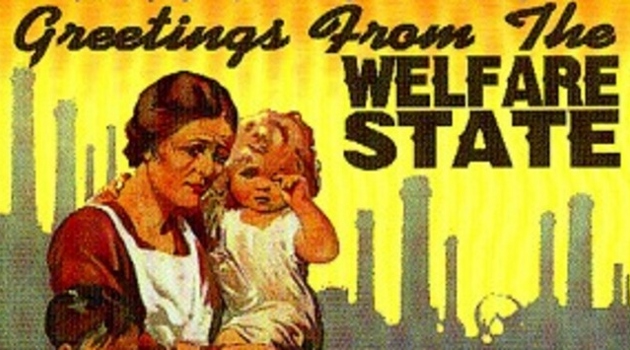At the risk of oversimplifying, there are two types of statists.
The first type is generally insincere and simply views bigger government and increased dependency as a strategy to obtain and preserve political power. Most inside-the-beltway leftists in Washington are in this category.
The second type genuinely cares about the less fortunate but makes the mistake of thinking that good intentions somehow lead to good results. You could call these people the Pope Francis leftists.
As you might imagine, there’s very little hope of persuading the first category of statists. You could show them all the data and evidence in the world, for instance, that a flat tax would boost prosperity, and they’ll simply shrug and tell you to jump in a lake because genuine tax reform would reduce the power and influence of Washington’s political elite.
But the second group of statists should be persuadable. That’s why I share so many comparisons of nations with smaller government and freer markets versus countries with bigger government and more intervention. I want open-minded folks on the other side to see how good policy leads to better economic performance, particularly since the poor will be big beneficiaries. That should be compelling, especially when combined with the data on how the welfare state simply traps poor people in government dependency.
I then try to augment that macro data with specific micro examples of how policies that seem compassionate actually backfire.
Is it compassionate, for instance, to increase the minimum wage if that means low-skilled workers can’t get jobs?
Alternatively, is it compassionate to extend unemployment benefits if that means people are less likely to get jobs?
Anyhow, all this discussion is simply to provide some context for a very good piece on the pitfalls of John Kasich and so-called compassionate conservatism.
In her Wall Street Journal column, Kimberly Strassel takes aim at Governor Kasich and other folks who think big government is somehow good for the poor.
…here’s one way to divide the arena: small-government reformers and big-government surrenderists. That debate is at the center of a bigger GOP meditation on how to better appeal to the poor and minorities. Mr. Kasich has emerged as the most eloquent and compelling spokesperson for the go-big camp. …his theme: that it’s OK to be “conservative” and have a “big heart.” It’s his way of excusing his decision to embrace ObamaCare’s expansion of Medicaid, putting that welfare program on track to consume 50% of Ohio’s operating budget in 2016.
Needless to say, Ms. Strassel doesn’t think Kasich’s embrace of Obamacare demonstrates a big heart.
Instead, it’s just the latest manifestation of the big-government conservatism that failed so badly last decade.
This is “compassionate conservatism”—or at least a bastardized version of it. George W. Bush first used that phrase to explain how conservative policies made everyone better off. But it would later turn into a license for Republicans to embrace government for their own conservative ends. Giant new education spending was needed to create school “accountability”; a new Medicare drug entitlement would create health-care “competition;” green-energy subsidies bolstered “national security.” …The philosophy got a revamp in the past year in the self-styled “reformicon” movement. …it’s Compassionate Conservatism 2.0.
And what happens when you cede the moral high ground and agree with the statists that bigger government somehow benefits people?
…underpinning the entire compassionate-conservative movement is a glum surrender to the entitlement state. The left has won; all that remains is to argue that conservative big-government is better managed than liberal big-government.
Ms. Strassel is much more impressed with what she calls the “small-government reformers.”
…there is another approach to compassion. It’s the version made popular by Jack Kemp, and embraced by House Ways and Means Chairman Paul Ryan—and a growing list of converts. It holds that there is nothing whatsoever compassionate about consigning low-income Americans to a government health-care system that delivers second-class outcomes. There’s nothing compassionate about making today’s working poor pay into a bleeding Social Security system… There’s nothing compassionate about propping up a federally run poverty industrial-complex that spends most of its money on itself. The Kemp-Ryan view knows that government is the problem, not the answer—not in any form. The answer is to devolve the money and power back to states and communities…spreading the gospel of smaller government, in the name of helping those most vulnerable.
Amen. Kemp was a hero in the battle to lower confiscatory tax rates, leading to a victory that was enormously successful in the 1980s. And Ryan deserves endless praise for his efforts to reform entitlement programs such as Medicare and Medicaid.
This is the approach that offers the most hope to the less fortunate because it enables growth and job creation.
Big-government conservatism, by contrast, undermines economic dynamism by acquiescing to the idea of an ever-growing state.
By the way, none of this suggests that John Kasich is universally bad on policy or that Paul Ryan is universally good. Kasich, after all, was Chairman of the House Budget Committee in the 1990s when genuine spending restraint led to a balanced budget. And Paul Ryan’s otherwise good ideas on tax reform have been marred by occasional flirtation with avalue-added tax.
What ultimately matters is whether a politician is – on balance – pushing to shrink the size and power of the federal government. So ultimately it’s an imperfect process of deciding which lawmaker is 75 percent good and which one is 65 percent good (or, in too many cases, comparing one who is 10 percent good with one who is 5 percent good).

